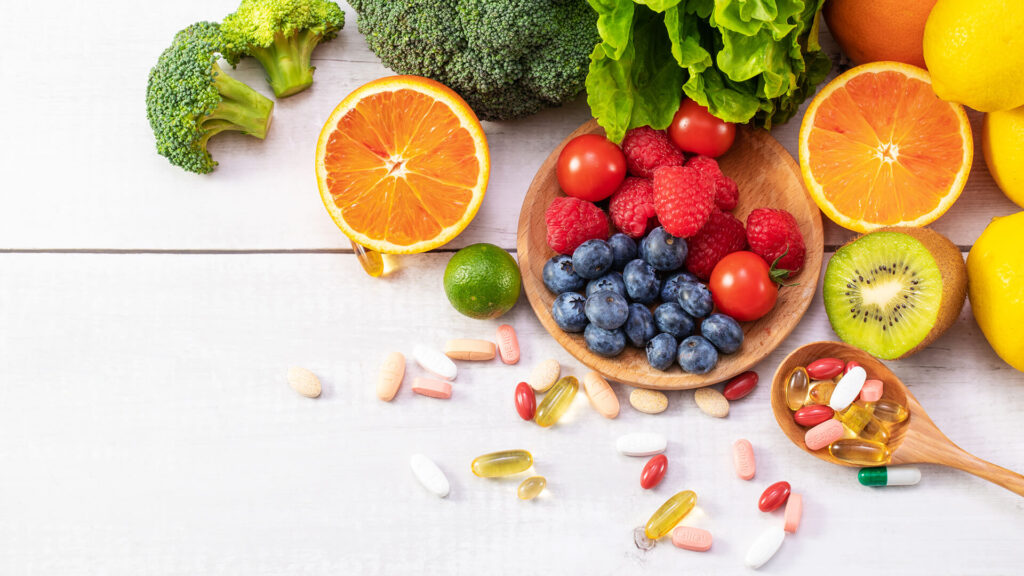
Five Reasons Why You Need More Than Just Fruits and Vegetables

While fruits and vegetables are undoubtedly powerhouses of essential vitamins, minerals, and antioxidants, a diet solely focused on them, while initially trendy, can be nutritionally restrictive and ultimately detrimental to your health.
While reaching for the rainbow of fruits and vegetables is crucial, it’s vital to recognize that they are just one piece of the balanced-diet puzzle. You need to include multivitamins like Diataal Nutripop, Diataal – D Nutripop, and Diataal Chocovits in your diet as well. In this blog, we’ll discuss five reasons why your food plate needs to go beyond the produce aisle and why you must use multivitamins like the ones from Diataal.
Five Reasons Why You Need More Than Just Fruits and Vegetables
Here are five reasons why you need more than just fruits and vegetables:
1. Building and Maintaining Muscle Mass
Fruits and vegetables are generally low in protein, the building block of muscle tissue. Protein is essential for numerous bodily functions, including growth, repair, and enzyme production. While some plants, like legumes and soy products, offer a good amount of protein, they often lack essential amino acids, the building blocks of protein.
Multivitamins like Diataal Nutripop provide a complete protein source, ensuring your body has the necessary tools to build and maintain muscle mass, which supports metabolism, bone health, and overall strength.
2. Sustained Energy Levels
Fruits and vegetables are fantastic sources of carbohydrates, particularly complex carbohydrates found in starchy vegetables and some fruits. However, their fibre content can lead to slower digestion and absorption, resulting in shorter energy bursts rather than sustained energy levels.
Including multivitamins like Diataal’s Nutripop Capsules in your diet alongside fruits and vegetables helps provide a steady stream of energy throughout the day. Whole grains like brown rice, quinoa, and whole-wheat bread release energy gradually, keeping you focused and preventing energy crashes.
3. Maintaining Healthy Fats
While fruits and vegetables provide some healthy fats, like those found in avocados and olives, they are not a significant source of essential fatty acids. These fats, particularly omega-3 and omega-6, are crucial for brain function, heart health, and maintaining healthy skin and hair.
Including supplements like Diataal Chocovits in your diet ensures you get your daily dose of essential fatty acids. Additionally, healthy fats from nuts, seeds, and healthy oils can help with satiety and support nutrient absorption from other food groups.
4. Bone Health and Calcium Needs
Fruits and vegetables, while abundant in vitamins and minerals, are not significant sources of calcium, crucial for maintaining strong bones and teeth.
Including calcium-rich supplements like Diataal – D Nutripop capsules in your diet ensures you meet your daily calcium needs. Calcium also plays a role in muscle function, nerve transmission, and blood pressure regulation, making it essential for overall health.
5. Fueling Your Brain and Mood
While fruits and vegetables are important for cognitive function, they may not provide all the necessary nutrients to keep your brain sharp and your mood balanced. Including complex carbohydrates, like whole grains, in your diet helps provide sustained energy for your brain, aiding focus and concentration.
Additionally, healthy fats, particularly omega-3 fatty acids found in fatty fish, have been linked to improved cognitive function and reduced risk of depression. Including a variety of lean protein sources also ensures you get enough iron, a mineral vital for oxygen transport to the brain and essential for maintaining a healthy mood and energy levels.

How to Create a Balanced Plate?
Knowing the importance of diversifying your diet beyond just fruits and vegetables is crucial. Here are some tips for creating a balanced plate:
- Fill half your plate with non-starchy vegetables: Aim for a variety of colours and textures to maximise your intake of vitamins, minerals, and fibre.
- Choose a quarter of your plate for whole grains: Brown rice, quinoa, and whole-wheat bread are excellent options.
- Include a lean protein source: Fish, poultry, lean meats, eggs, or beans can be incorporated into your meals.
- Don’t forget healthy fats: Opt for nuts, seeds, healthy oils, and fatty fish for your daily dose of essential fatty acids.
- Limit added sugars and unhealthy fats: Processed foods, sugary drinks, and excessive red meat should be consumed in moderation.
Try Diataal Nutripop Capsules
Incorporating a multivitamin like Diataal Nutripop Capsules can be a valuable tool in addressing potential nutrient gaps and supporting overall well-being. These capsules offer a comprehensive blend of 9 vitamins and 11 minerals, including:
- Biotin, beta carotene, cyanocobalamin (vitamin B12), zinc, folic acid, selenium, and cholecalciferol (vitamin D): These nutrients contribute to a stronger immune system.
- Vitamin B complex (thiamine, pyridoxine, nicotinamide, biotin): This group plays a crucial role in energy production.
- Beta carotene, nicotinamide, and zinc: These are essential for healthy skin.
- Biotin and zinc: These are required for healthy hair growth.
The Bottom Line
Fruits and vegetables are undoubtedly a cornerstone of a healthy diet, but they are not the only piece of the puzzle. Including other food groups like whole grains, lean protein sources, healthy fats, and dairy products ensures you’re providing your body with the diverse range of nutrients it needs to thrive.
By embracing a balanced and varied approach to your diet and using multivitamins like Diataal Nutripop, Diataal – D Nutripop, and Diataal Chocovits you can fuel your body and mind for optimal health, well-being, and sustained energy.
FAQs
I already eat a lot of fruits and vegetables. Do I still need other food groups?
Absolutely! While fruits and veggies are vital, a balanced diet incorporates protein, complex carbs, and healthy fats for complete nutrition.
Don’t fruits and vegetables provide all the protein I need?
While some fruits and veggies contain protein, it’s usually insufficient to meet daily needs. Including protein sources like fish, eggs, or beans ensures your body has the building blocks it needs.
Are all carbs bad for me?
Not all carbs are created equal! Complex carbs in whole grains and starchy vegetables offer sustained energy and fibre, unlike refined carbs found in sugary treats.
I’m afraid of fat. Do I need to avoid all fats?
Healthy fats are essential for nutrient absorption, cell health, and hormone production. Choose healthy fats like those found in fish, avocado, and nuts, and limit saturated and trans fats.
What’s the best way to ensure a balanced diet?Are all carbs bad for me?
Include a variety of foods from all food groups on your plate. Aim for colourful fruits and vegetables, whole grains, lean protein, and healthy fats.



